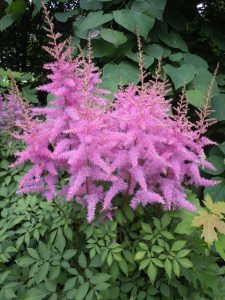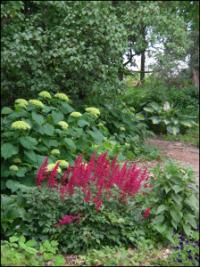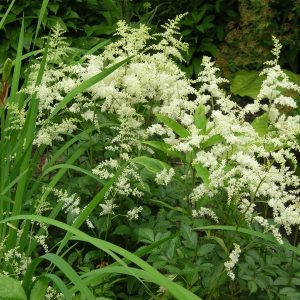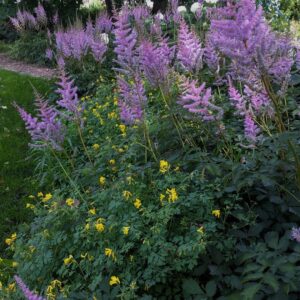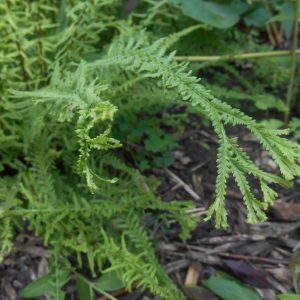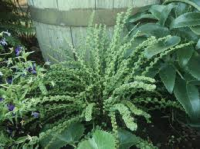Shop
Showing 105–112 of 788 results
-
Astilbe andresii ‘Amethyst’ Z 5-8
pink plumes flowering in July, with oxblood tinged foliage
OUT OF STOCK
Three foot tall pink plumes flowering in July, with oxblood tinged foliage
Size: 36"x 24"
Care: sun to part shade, moist soil essential. Immune walnut toxicity
Wildlife Value: attracts butterfliesAstilbe is Greek from a meaning “without” and stilbe meaning “lustre” referring to the fact that the leaves are not shiny. Early hybrid by George Arends, nurseryman from Ronsdorf, Gemany (1862-1952).
-
Astilbe andresii ‘Fanal’ Z 4-8
Marlboro red plumes in June
Striking Marlboro red plumes in June
Size: 24"x 18"
Care: sun to part shade, moist soil. Immune walnut toxicity
Wildlife Value: attracts butterflies
Awards: Royal Horticultural Society Award of Garden MeritAstilbe is Greek from a meaning “without” and stilbe meaning “lustre” referring to the fact that the leaves are not shiny. Cross of A. japonica and A. davidii made by Arends, nurseryman from Ronsdorf, Gemany (1862-1952), in 1930.
-
Astilbe andresii ‘Brautschleier’ Bridal Veil Z 4-8
White plumes turning creamy in July
White plumes turning creamy in July
Size: 30” x 30”
Care: sun to part shade, moist soil essentialAstilbe is Greek from a meaning “without” and stilbe meaning “lustre” referring to the fact that the leaves are not shiny. Hybrid by George Arends, nurseryman from Ronsdorf, Germany in 1929.
-
Astilbe chinensis luo xin fu in China Z 4-9
Pink plumes in mid-summer atop fern-like foliage. More tolerant of sun and well-drained soil than the hybrids.
Pink plumes in mid-summer atop fern-like foliage. More tolerant of sun and well-drained soil than the hybrids.
Size: 24” x 24” spreads
Care: Sun to shade in moist or moist well-drained soil
Native: Siberia, China, KoreaAstilbe from “the Greek word for without” and stilbe meaning “lustre” referring to the fact that the leaves are not shiny. 1st described for the West by botanist Carl Johann Maximowicz in 1859 and then named Hoteia chinensis. Liberty Hyde Bailey termed this plant “graceful” in the early 1900’s.
-
Astrantia major Masterwort Z 4-7
Blush white flower clusters on stalks growing from a single point on each stem stand tall above palmately divided foliage all summer
Blush white flower clusters on stalks growing from a single point on each stem stand tall above palmately divided foliage all summer
Size: 12-36” x 12”
Care: Sun to shade in moist to moist well-drained soil
Native: Europe
Awards: Elisabeth Carey Miller Botanical Garden Great Plant PicksAstrantia is Greek meaning “star” referring to the star-like appearance of the flowers. In European gardens by 1596 and colonial gardens in Plymouth Massachusetts Bay Colony in the 1630’s. Root used as a purgative.
-
Athyrium filix femina ‘Victoriae’ Victoria lady fern Z 4-8
Finely divided fronds have tiny, twisted leaves that cross one another. Vigorous grower. Dr, John Mickel, former curator of ferns at the New York Botanical Garden, called this “the Queen of green.” It is like no other fern.
OUT OF STOCK
Finely divided fronds have tiny, twisted leaves that cross one another. Vigorous grower. Dr, John Mickel, former curator of ferns at the New York Botanical Garden, called this “the Queen of green.” It is like no other fern.
Size: 18-24” x 18-24”
Care: part to full shade in moist to moist well-drained soilPopular Victorian fern. Discovered in Scotland in 1861.
-
Athyrium filix-femina Lady fern Z 3-8
Clumping fern with lance-shaped, double compound fronds – leaflets upon the midrib usually opposite one another, 1-2’ long and 5-12” wide and tapered to a point at the tip. One of the easiest ferns to grow.
Clumping fern with lance-shaped, double compound fronds – leaflets upon the midrib usually opposite one another, 1-2’ long and 5-12” wide and tapered to a point at the tip. One of the easiest ferns to grow.
Size: 4’ x 2-4’
Care: moist to well-drained soil in full to part shade
Native: temperate No. America including Wisconsin
Awards: England’s Royal Horticultural Society Award of Merit.Chippewa made a decoction of the root for it diuretic. Meskwaki made a decoction from the roots to relieve breast pain after childbirth. For Ojibwa and Potawatomi it brought on milk flow in nursing mothers with caked breast. Ojibwa also dried and grated roots to heal sores. Quileute wiped fish with the leaves and ate roasted, peeled root.
First described for botany, but given a different name, by English botanist Leonard Plukenet (1641-1706) in 1692. -
Athyrium filix-femina ‘Frizelliae’ Tatting fern Z 4-8
Clumping fern bearing unusual fronds – button-like along the midrib
OUT OF STOCK
Clumping fern bearing unusual fronds – button-like along the midrib
Size: 18” x 18”
Care: Moist humusy soil in part sun to part shade
Awards: Great Plant Pick Award from Elizabeth Carey Miller Botanical Garden.Short genetic mutation of Lady Fern discovered in 1857 in Mrs. Frizelle’s garden in Ireland.

